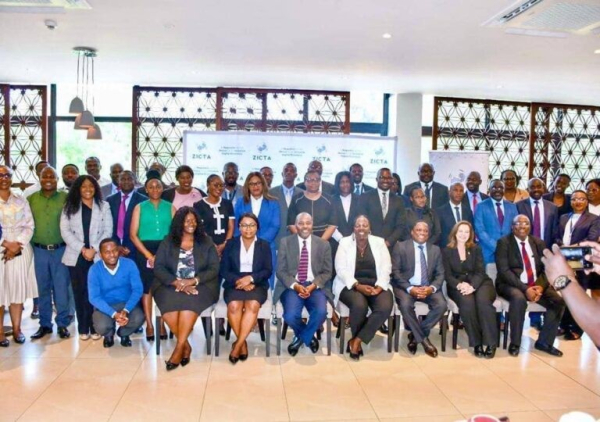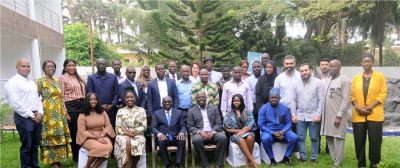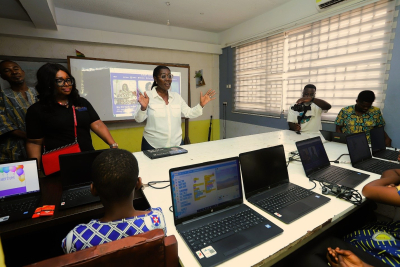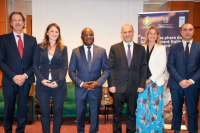He aims to simplify the marketing of farmers' products. To achieve this, he leverages technology to provide them with broader access to new markets.
Shadrack Kubyane (photo) is a South African tech entrepreneur, co-founder, and CEO of eFama App, a digital platform designed to connect farmers with commercial buyers and consumers.
Launched in 2022, eFama aims to enhance food security through digital innovation. The app enables farmers to sell fresh produce and meat directly to individual consumers and professional clients, including restaurants, retailers, and hotels.
eFama is an initiative of Coronet Blockchain, a start-up co-founded by Kubyane. The platform leverages blockchain technology to optimize the supply chain end-to-end. It connects international manufacturers with African small and medium-sized enterprises (SMEs), while also providing business formalization tools and quality authentication systems for products.
Kubyane also serves on the board of Coronet48, a media platform dedicated to showcasing African start-ups. Each year, Coronet48 highlights 1,000 startups to watch, sharing their stories, the journeys of their founders, and the impact they are making.
Kubyane holds a bachelor's degree in Media and Communications, earned in 2005 from the University of KwaZulu-Natal. In 2007, he joined South Africa's Government Employees Medical Scheme (GEMS), where he managed key client portfolios and national sales. Concurrently, he served as National Business Development Manager at Deloitte.
From 2010 to 2019, he was Director of Market Entry and Expansion at Gershon South Africa, a business services and consulting firm. Between 2019 and 2020, he held various leadership roles in business development across public and private sector organizations.
Melchior Koba
As digital adoption rises across Africa, so does cybercrime, threatening national security. Tackling these threats is essential for protecting digital economies and fostering sustainable growth.
Zambia announced on November 19 that it is strengthening its defenses against cybercrime through a partnership with the International Telecommunication Union (ITU). This collaboration aims to enhance digital security by equipping prosecutors and law enforcement with advanced skills to tackle emerging cyber threats.
Technology and Science Minister Felix Mutati, speaking through his representative, director of communication and digital technologies, Milner Makuni emphasized that the escalating cyber threats demand continuous professional training and collaboration. Equipping law enforcement with skills in digital forensics and AI-driven tools for threat detection will create a safer cyber environment for citizens and businesses alike.
The event, hosted in collaboration with the International Telecommunication Union (ITU) and the Zambia Information and Communications Technology Authority (ZICTA), highlighted the urgency of addressing rising cybercrime incidents.
Key initiatives announced include training and reskilling programs to equip prosecutors and stakeholders with expertise in digital forensics, electronic evidence management, and predictive analysis technologies. Legislative enhancements are also underway, with ongoing revisions to the Cyber Security and Cyber Crimes Act to ensure a robust and adaptive legal framework.
ITU representative Annrita Ssemboga praised Zambia’s proactive role in the Global Digital Compact and commended its efforts to advance cybersecurity on the continent. ZICTA Acting Director-General Engineer Collins Mbulo highlighted the growing scope of digital crimes, urging regulators and law enforcement to remain vigilant.
In 2021, the Zambia Computer Incident Response Team (ZM-CIRT) recorded over 10.7 million cyberattacks, including mobile money scams, social media hijacking, and fraudulent online schemes. Between 2020 and the second quarter of 2022, the financial sector lost over K150 million, with K6 million attributed to pyramid schemes. These figures underscore the growing threat of cybercrime in Zambia.
This initiative strengthens Zambia's digital resilience, fostering economic opportunities while protecting its citizens and businesses from escalating cyber threats. By aligning with global standards and leveraging advanced technology, Zambia is setting a benchmark for cybersecurity in the region, essential for long-term socio-economic stability.
Hikmatu Bilali
The National Communications Authority (NCA) of Ghana, in collaboration with the Ministry of Communications and Digitalisation and mobile network operators (MNOs), is negotiating with Gambian stakeholders to implement the ECOWAS Free Roaming initiative.
The ongoing talks, held from November 19 to 21, 2024, are expected to result in a Memorandum of Understanding (MOU). This effort will lower telecommunications costs for travelers between Ghana and The Gambia.
Ghana has established ECOWAS roaming agreements with Côte d’Ivoire, Benin, and Togo, which provide local rates for calls and SMS, free reception of local and international calls, and internet access priced at local rates.
Ghana to Establish ICT Lab in Bouya Community to Boost Digital Inclusion
The Minister of Communications and Digitalisation Ursula Owusu-Ekuful announced, on November 18, plans to establish an Information and Communication Technology (ICT) lab in Bouya Community. This initiative aims to bridge the digital divide and enhance ICT literacy among residents.
The ICT lab will provide residents with access to digital skills training, e-learning platforms, and online resources, creating opportunities for education, entrepreneurship, and global connectivity.
The project aligns with the government’s broader vision of leveraging technology to drive innovation and economic progress across Ghana.
Developped to support merchants in restocking their supplies, it positions itself as an intermediary to facilitate and streamline various commercial transactions.
Vuleka is a business-to-business (B2B) e-commerce platform developed by a South African startup to transform how informal merchants replenish their stocks. Founded in 2017 by Brian Makwaiba, the Johannesburg-based platform connects shop owners with small-scale manufacturers and wholesalers.
Vuleka allows users to create accounts and place orders either through its Android or iOS app or via WhatsApp. The platform consolidates these orders and purchases products in bulk directly from suppliers.
“We build credit profiles for informal and unbanked business owners platform then provide them with credit (loans) in order to acquire stock from us. They in turn give stock on credit to their customers who then pay them at an agreed upon time,” explains the startup.
To ensure seamless operations, Vuleka employs field agents who handle last-mile deliveries, assist with order placements, and collect data on products and customers. This data enables Vuleka to offer market insights, empowering manufacturers and merchants to make strategic decisions.
Vuleka’s innovative model has garnered recognition, earning it a spot in the eighth cohort of the Google for Startups Accelerator program. Alongside five other startups, Vuleka will receive a grant of 1 million rand (approximately $55,415), Google Cloud credits, individualized training, and access to a network of mentors.
Adoni Conrad Quenum
A finance expert and advocate for financial inclusion in Africa, she is passionate about digital transformation. Leveraging technology, she provides digital financial services to Cameroonians, aiming to bridge the gap and empower underserved communities.
Grace Jerolgan Nganakala (photo) is a Cameroonian accountant by training and a tech entrepreneur. She is the co-founder and CEO of Futa, a fintech startup transforming how Cameroonians manage their mobile money transactions.
Founded in 2022 by Grace Jerolgan Nganakala and Daniel Dang, Futa offers an innovative platform that consolidates all mobile money accounts into a single interface. This solution streamlines money transfers and payments across different operators while providing critical support to micro, small, and medium-sized enterprises (MSMEs). Businesses can efficiently pay suppliers and employees, while employees gain simplified access to fast loans.
“Our platform develops a credit scoring system based on salary data and payment history to ease payroll management, boost employee productivity through hassle-free microloans, and accelerate credit analysis for financial institutions,” explains Nganakala.
In addition to her work with Futa, she co-founded Bayebi Consulting in 2021, a management consulting firm specializing in digital marketing and information technology. Bayebi Consulting supports businesses in achieving operational excellence.
Nganakala holds a bachelor’s degree in accounting from Ghana Communication Technology University (GCTU), earned in 2017. She later obtained a master’s degree in finance from GBSB Global Business School in Spain in 2019 and another in international finance from the Graduate School of Management in Barcelona in 2020.
Her professional journey began in 2016 as an accounting assistant at Nissi Pharma, a Ghanaian pharmaceutical distribution company. In 2018, she joined the Barcelona-based fintech Kantox as a financial assistant. She later served as the administrative and financial manager for Dimbaya.com, a financial platform, in 2020.
Melchior Koba
The Lagos State Government has awarded N100 million ($59, 618.93) in grants to 26 innovative agripreneurs. The announcement was made during the inaugural Lagos Agrinnovation Summit held on November 14.
Beyond the financial support, these entrepreneurs receive mentorship, technical assistance, and access to an extensive professional network to scale their ventures.
The grants aim to promote sustainable practices across the agricultural value chain. It is part of Lagos State’s broader strategy to engage youth in agriculture and create a sustainable economy.
After graduating with a bachelor's degree, he moved to France, where he lived and worked for several years in the tech industry. He then embarked on an entrepreneurial journey, creating digital solutions for both professionals and individuals.
Fabrice Tra (photo) is an Ivorian computer scientist and tech entrepreneur. He is the co-founder and CEO of bim!, a company specializing in digital networking solutions.
Founded in 2022, bim! offers an innovative digital business card that allows users to instantly share personal or professional information with a friend, prospect, or client. This eco-friendly solution aims to make networking simpler, more efficient, and reliable. The startup’s products are managed via a mobile app, enabling users to store and update their professional details. The app also facilitates network management and prospect data collection at trade shows, fairs, and other professional events.
In addition, Fabrice Tra is the co-founder and Chief Technology Officer of Tuzzo, a startup launched in 2023. Tuzzo helps merchants boost their revenue by selling products through social media platforms like Facebook, WhatsApp, Instagram, and TikTok. It offers an application that centralizes all sales channels, streamlines operations, and enables targeted promotional campaigns to build customer loyalty and drive sales.
Fabrice Tra holds a bachelor’s degree in computer science from the Félix Houphouët-Boigny National Polytechnic Institute (INP-HB) in Yamoussoukro, Côte d’Ivoire, obtained in 2018. He also earned a master’s degree in computer methods applied to business management from the University of Rennes in 2021.
His career began in 2017 at Global Business Link Group, a company specializing in digital transformation, where he worked as an assistant IT project manager. In 2019, he interned in data visualization at Inria, France’s national institute for research in digital sciences and technologies.
In 2020, Tra joined DataGrowb’, a French company specializing in data and artificial intelligence, as an AI consultant. He later worked at Avril, a French industrial and financial group, as a technical architect. From 2021 to 2023, he served as a business and data analyst at Capgemini, a global leader in technology services.
Melchior Koba
Digital transformation has become a crucial driver of economic and social development worldwide. Governments and their partners are stepping up initiatives to harness digital potential and bridge technological divides.
On Monday, November 18, the Ivorian government launched the Digital Readiness Assessment (DRA) and the Digital Flagship for West Africa project. Spearheaded by the Ministry of Digital Transformation and Digitalization, in partnership with the United Nations Development Programme (UNDP) and the Italian embassy, these initiatives aim to strengthen the digital ecosystem and advance Côte d'Ivoire toward a connected, inclusive society.
“Although it’s just one step, we’re realizing a vision a Côte d'Ivoire firmly committed to digital transformation as championed by President Alassane Ouattara,” stated Ibrahim Kalil Konaté, Minister of Digital Transformation and Digitalization.
The Digital Readiness Assessment, developed by UNDP, serves as a strategic tool to set data-driven digital priorities. It also identifies technological opportunities that could accelerate sustainable development goals and enhance the country's digital preparedness.
Funded by the Italian government, the Digital Flagship for West Africa project focuses on improving connectivity in rural and remote areas, strengthening digital infrastructure, and creating efficient public digital systems.
Both projects align with the National Digital Development Strategy for 2025, which aims to connect the entire country, develop digital skills among civil servants and young people, and support digital entrepreneurship. Côte d'Ivoire has already made significant strides, with more than 30,240 km of fiber optic cable installed, covering 94.86% of the country’s localities as of March 31, 2024, according to the telecom regulator.
These new initiatives are expected to provide a detailed assessment of existing infrastructure, pinpoint gaps, and outline strategic priorities for balanced sector development. They also aim to reduce the digital divide by bringing quality Internet access to underserved areas, thereby promoting digital inclusion and territorial equity.
Samira Njoya
Starlink, SpaceX’s satellite internet service, is preparing to launch in Tanzania. Its local subsidiary, Starlink Satellite Tanzania Limited, has applied for national network facilities and application services licenses with the Tanzania Communications Regulatory Authority (TCRA), as confirmed in a public notice on November 15, 2024.
The TCRA has opened a 14-day public consultation period for stakeholders to comment on the applications, with a decision expected afterward.
Starlink’s expansion into Tanzania could help bridge the digital divide and improve connectivity nationwide.The service aims to provide high-speed satellite internet, particularly in underserved rural and remote areas.
More...
Somali authorities aim to strengthen digital infrastructure. The telecom regulator is working with the International Finance Corporation (IFC) to develop a new regulatory framework for fiber-optic submarine cables.
Somali plans to improve the country’s digital infrastructure by developing a unified fiber-optic deployment policy. For that purpose, the Ministry of Communications and Technology held public consultations on November 17 and 18 to gather input from stakeholders.
“The unified fiber-optic deployment policy aims to guide national telecom companies toward collaboration in installing and expanding fiber-optic cables. This initiative will help reduce the costs associated with deploying and expanding fiber infrastructure while promoting the growth of a modern digital economy and national interconnectivity,” the ministry announced on its Facebook page on November 17.
In its Digital Economy Diagnostic – Somalia report, published in March 2024, the World Bank indicated that Somalia’s domestic fiber network remains significantly underdeveloped and fragmented. It noted that only isolated segments have been deployed by sub-regional operators, while cross-border links remain weak. Although Somalia is connected to five international submarine cables, with a sixth expected in 2025, the lack of a robust domestic infrastructure limits the equitable distribution of available capacity.
“The absence of a robust backbone network prevents the distribution of international capacity across Somalia, yielding uneven access to broadband, mixed network quality, limited redundancy, and hampers market competition,” the report stated.
Densifying the national fiber-optic network through this policy could improve internet quality and coverage across Somalia. However, challenges persist, as the World Bank pointed out, which could hinder internet adoption, with penetration rates standing at only 27.6% in early 2024, according to DataReportal. Key obstacles include limited access to affordable, broadband-compatible devices, a lack of attractive data-based services, insufficient relevant local content, and a digital skills gap.
Isaac K. Kassouwi
Cloud technologies are essential to modern IT, enabling businesses to create scalable and resilient applications. However, a shortage of skilled professionals hinders adoption. Training African developers in this field opens access to high-paying tech jobs locally and globally.
Global talent outsourcing company Andela announced on November 15 a partnership with the Cloud Native Computing Foundation (CNCF) to train 20,000 to 30,000 African developers in cloud-native basics. This initiative is part of a three-year program aimed at addressing the growing global demand for cloud-native expertise.
Andela CEO Carrol Chang highlighted the growing demand for skilled tech professionals in Africa. ”We are excited to partner with CNCF to extend training and, ultimately, enhance job opportunities for African workers. The continent is emerging as one of the most important markets in the world […] and its young workforce will be key to solving the tech talent shortage,” she stated.
The training program will take participants six to nine months to achieve certifications and is designed to ensure graduates are equipped to meet the needs of the global cloud-native ecosystem. It will focus on key cloud-native tools, including Kubernetes, and prepare participants for industry certifications like the Kubernetes and Cloud Native Associate (KCNA) and Certified Kubernetes Application Developer (CKAD).
The program will be available to Andela’s talent marketplace of over 150,000 professionals, predominantly from Africa. Andela’s talent marketplace in Africa spans 49 countries; including Nigeria, Kenya, and Ghana.
According to The Rise of the African Cloud 2023 report by Xalam Analytics, the African cloud market has emerged as a multi-billion-dollar opportunity, experiencing annual growth rates of 25% to 30%. This represents a transformative opportunity for the continent and global technology ecosystems through the creation of high-demand roles in IT.
The collaboration between Andela and CNCF offers African developers the chance to gain in-demand cloud computing skills, addressing the global talent shortage and enhancing their access to international opportunities. This initiative is a significant step toward bridging the digital skills gap, empowering African tech talent, and establishing their role as key contributors to the global technology landscape.
Hikmatu Bilali
African parliaments are increasingly turning to digital technologies to improve efficiency. However, the digital divide remains a significant challenge, hindering progress in many regions.
South Africa (8 out of 10), Zimbabwe (8), Burundi's Senate (7), Morocco (7), and Mauritius (7) lead the continent in digital maturity among African parliaments, according to a new report published in October 2024 by the Inter-Parliamentary Union (IPU), a global organization of sovereign state parliaments. The report is based on responses from 115 parliaments or chambers across 86 countries, as well as from supranational parliamentary organizations.
Titled the "World e-Parliament Report 2024," the report offers a comprehensive analysis of digital technology use in parliaments worldwide through a digital maturity index, an innovative benchmarking tool. This index assesses parliaments across six key areas: governance, digital strategy and management; infrastructure; parliamentary systems; user support; digital content and publications; and citizen engagement.
“The purpose of benchmarking is not to create a league table of ‘good’ or ‘bad’ parliaments. Rather, it supports strategic decision-making on the use of digital technologies by highlighting the factors that can affect maturity,” the IPU stresses.
In addition to the leaders, Tunisia (6), Burundi's National Assembly (5), and Malawi (5) stand out with scores of 5 or higher. However, sub-Saharan Africa remains underrepresented among the top performers. According to the IPU, 50% of parliaments in the region rank among the 30 least digitally mature institutions, a situation attributed to a lack of modernization initiatives, insufficient investment in new digital systems, and an absence of ambitious digital transformation programs.
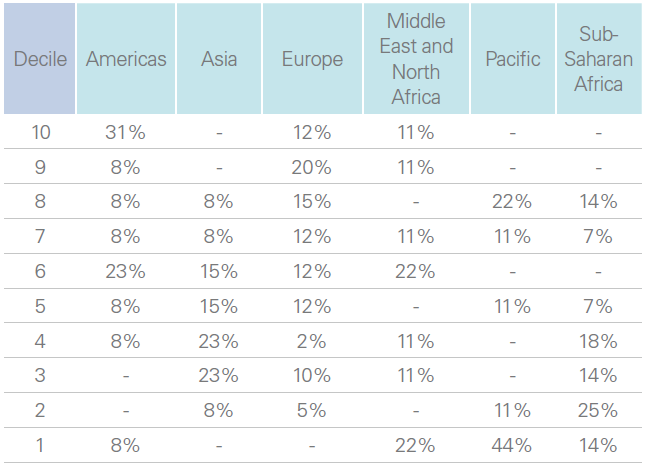
Distribution of parliaments by region for each decile ranking
At the bottom of the index, parliaments in countries like Djibouti, Lesotho, Madagascar, and the Central African Republic scored an average of 1 out of 10, reflecting significant gaps in digital adoption.
To address these gaps, the report recommends that institutions and governments develop clear strategic visions and comprehensive digital strategies; allocate adequate financial, human, and technological resources; establish robust governance frameworks; invest in capacity building; prioritize citizen participation; and strengthen inter-parliamentary collaboration.
Additionally, generative artificial intelligence is highlighted as a strategic lever to accelerate parliamentary digital transformation, offering the potential to deliver valuable insights and enhance the accessibility of parliamentary processes.
Samira Njoya
Lire aussi:
In recent years, ride-hailing services have gained popularity across Africa. In Nigeria, two tech entrepreneurs have decided to enter the market by offering luxury ride-hailing services.
Wenzo is a premium ride-hailing solution developed by a Nigerian startup. The platform, launched in 2023 by Precious Okafor and Gbenga Fola-Alade, Wenzo operates offices in Lagos, Nigeria; Accra, Ghana; and Dover, Delaware, in the United States.
It offers an iOS-exclusive mobile app, where users create an account to access the service. Based on their location and destination, they are matched with drivers ready to provide their rides. Notably, Wenzo collaborates with various leisure destinations from beaches to restaurants to enhance the experience for users headed to these spots in its service areas.
Beyond standard rides, Wenzo allows bookings for events, such as weddings, conferences, or tourist outings, providing transportation for guests or speakers to select venues. Since its launch, the startup has not conducted any fundraising to fuel its growth.
In October, it was selected as one of ten early-stage startups to pitch at Angel Fair Africa in Nairobi, Kenya. Organized by Chanzo Capital in partnership with Startupbootcamp AfriTech, MEST Africa, Antler, iHub, and GrowthAfrica, the event offers Wenzo a chance to capture investor interest for potential future funding rounds.
Adoni Conrad Quenum



